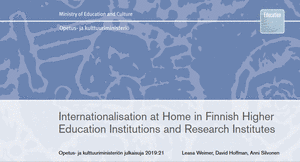
This study on the current status of internationalisation at home was carried out for the Ministry of Education and Culture by the Finnish Institute for Educational Research, based at the University of Jyväskylä. The purpose of the study was to investigate how much attention had been paid to internationalisation at home in institutions of higher education and research and to ways in which related practices had been implemented.
Based on an online survey on 889 respondents and 28 semi-structured interviews in four higher education institutions, the study resulted in seven key findings:
- (Un)familiarity: although in theory, internationalisation at home (IAH) was known and understood, practice was less familiar, especially among academics;
- (Un)importance: the level of importance of IAH decreases from among international officers (74% find it important) to academics and students (close to 50%) to research institutions (less than 50% deem it important and 33% do not know whether it is important or not);
- (Un)equal opportunities: due to a lack of strategic approach, some promising practices result in unequal opportunities for development of intercultural skills among students;
- Promising practices: such as joint courses with Finnish students and matching with local families show good potential for further development of IAH;
- The role of international staff and students in IAH: the role of international staff is clearly identified, especially teaching staff, whereas the frequent segregation of international students, mentioned by many respondents, results in lack of clarity about what international students bring to IAH;
- Regional differences among HEIs are linked to how the HEI and their environment perceived its international character;
- Challenges and obstacles, categorised in four main groups: 1) assumption that the use of English and international staff equal IAH; 2) unclear language policies; 3) fear of losing Finnish academic language and 4) the challenge of integrating international students and staff is seen as a missed opportunity for IAH.
The report sets out a series of recommendations to be adopted at different levels (higher education institutions, faculties and departments, in teaching and administration, and among students), including:
- promoting internationalisation at home, cross-cultural competence and language skills among teachers and administrators;
- refining intercultural teaching methods and evaluating skills;
- including intercultural skills and internationalisation at home in personal study plans;
- including indicators of internationalisation at home in agreements on performance targets.
More information here
